IN SEARCH OF
“The Way We Were”
Bradford Dillman was a dashingly handsome star of stage and screen. His acting career was prolific, with at least 140 film and television credits. Although in the last days of his life, fire and flood would keep him from returning to his Montecito home, VNA Health’s Serenity House would help both Bradford and his family find “the way we were.”
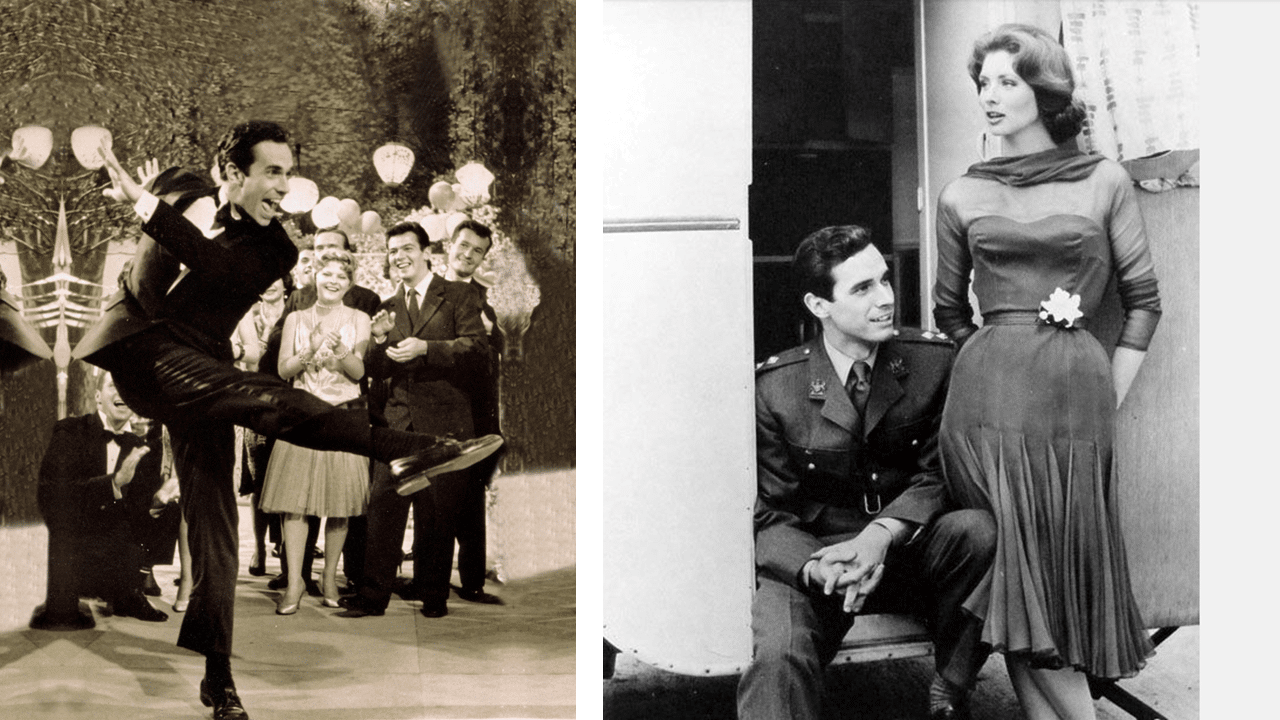
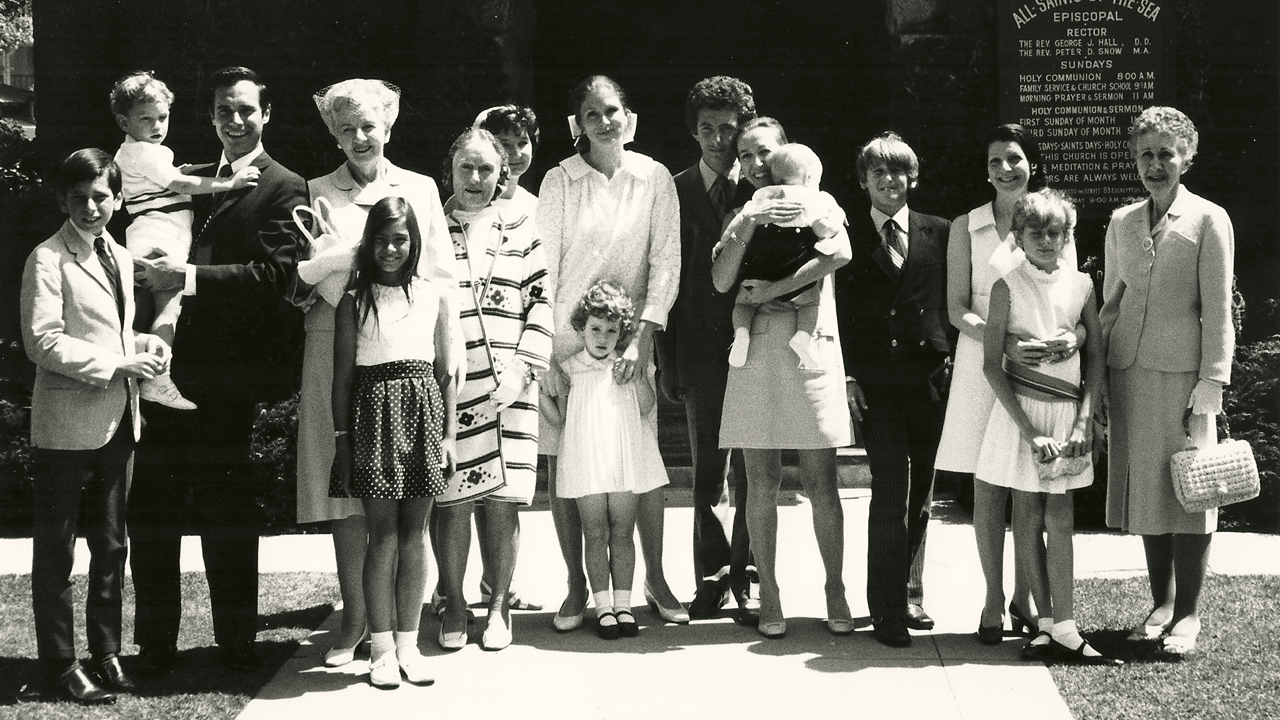
Bradford Dillman, third from left, with extended family outside of All Saints By The Sea Episcopal Church in Montecito, CA.
In 2008, after a serious fall, Bradford Dillman, renowned Broadway star and award winning Hollywood actor, moved back home with his daughter, Pamela Dillman Haskell, and her family.
As an officer and longtime member of the Board of Directors for VNA Health, Pamela knew that she would need help providing the personal home care her father needed; and that eventually her father would want home hospice care from VNA Health, just as they had arranged for Pamela’s stepmother, Suzy. Bradford had expressed his wishes for when he faced end of life, but unforeseen natural disasters would make fulfilling his wishes more difficult.
On Friday, December 8, 2017, as the Thomas Fire was growing, though not yet threatening Santa Barbara County, Pamela and her daughter Frankie, headed south with 40 girls and their moms for a dance competition and convention in Los Angeles. She was concerned leaving her father at home with poor air quality from the smoke, but remembered, “Dad’s not going to be leaving the house,” and her husband, Chris, would be home with him. By Sunday, Montecito was put under mandatory evacuation. “That morning it was all over the news, and we were receiving text alerts to move quickly,” Pamela recalled. “We’ve got to get Dad out of the house. We’ve got to get Dad out of the house!”
Bradford was already fragile and in a sensitive state, so there was some concern that exposure to the air quality would weaken him even more, but continuing to stay at home in the path of the fire was clearly not an option. Bradford was evacuated to his son’s Los Angeles home, where he stayed until the day before the evacuation order was lifted; then he fell ill. A minor heart attack and pneumonia resulted in an ambulance ride to the hospital.
“By the time I saw him in the hospital, the look in his eye was so fearful, afraid, and angry,” Pamela recalled. “It was hard to interpret what he wanted and the doctors were saying that it could go either way. As a family, we had a hard time interpreting the look in his eye. Was it fear of death or desperation to go on his own terms and time?”
The family teetered between choosing to continue the extreme life support measures in the ICU or to remove them to allow for a natural passing. After ten days, the feeding tube was removed, Bradford’s condition improved, and the evacuation orders from the Thomas Fire were lifted.
Pamela knew that she needed to get her dad home, but he was not strong enough to return home, so Cottage Hospital would be the next best thing.
However, the challenges continued as there were no beds available at Cottage due to the flu epidemic, and Bradford’s condition again took a turn for the worse, sending him back to the Olympia Medical Center ICU in Los Angeles.
On January 3, 2018, thanks to the diligence of Dr. Chris Thrash and other physicians and staff at Cottage, Bradford was safely moved to the ICU at Cottage Hospital in Santa Barbara. Days later, the January 9 storm, flood, and debris flows closed the 101 freeway, which would have marooned Bradford and his family in Los Angeles, preventing him from coming home and being where he truly wanted to be.
“And so if it hadn’t been that we had gotten him into Cottage before the mudslide, he would not have been able to be up here at all,” Pamela shared. “So that was a tremendous blessing, it really was a gift.”
Once at Cottage Hospital and within 24 hours, Dr. Thrash sat Pamela down and further explained her father’s current status. “I want to remove the tube again because I have seen some improvement with his pneumonia,” Dr. Thrash said. “We are going to be facing a situation where once the tube is removed, if he does not progress further in betterment, you will have to make a decision about hospice or reinserting the tube; in which case he would need to be restrained to prevent him from removing the tube due to the confusion he is experiencing from the dementia.” Fortunately, the tube was removed, his pneumonia did not progress, and his condition stabilized, so Bradford was moved to a private room at Cottage Hospital.
Pamela shared that the nurses were so attentive. “They would always ask him, ‘Do you want anything?’ And my dad would reply in a soft voice ‘No,’ but then he would croak out, ‘Thank you very much.’ He was so polite and he was comfortable again. I just knew that we’d done the right thing by this time.”
One night, while Pamela slept in the chair next to her father’s hospital bed, she was jolted awake by a rustling in the bed and her father’s voice singing.
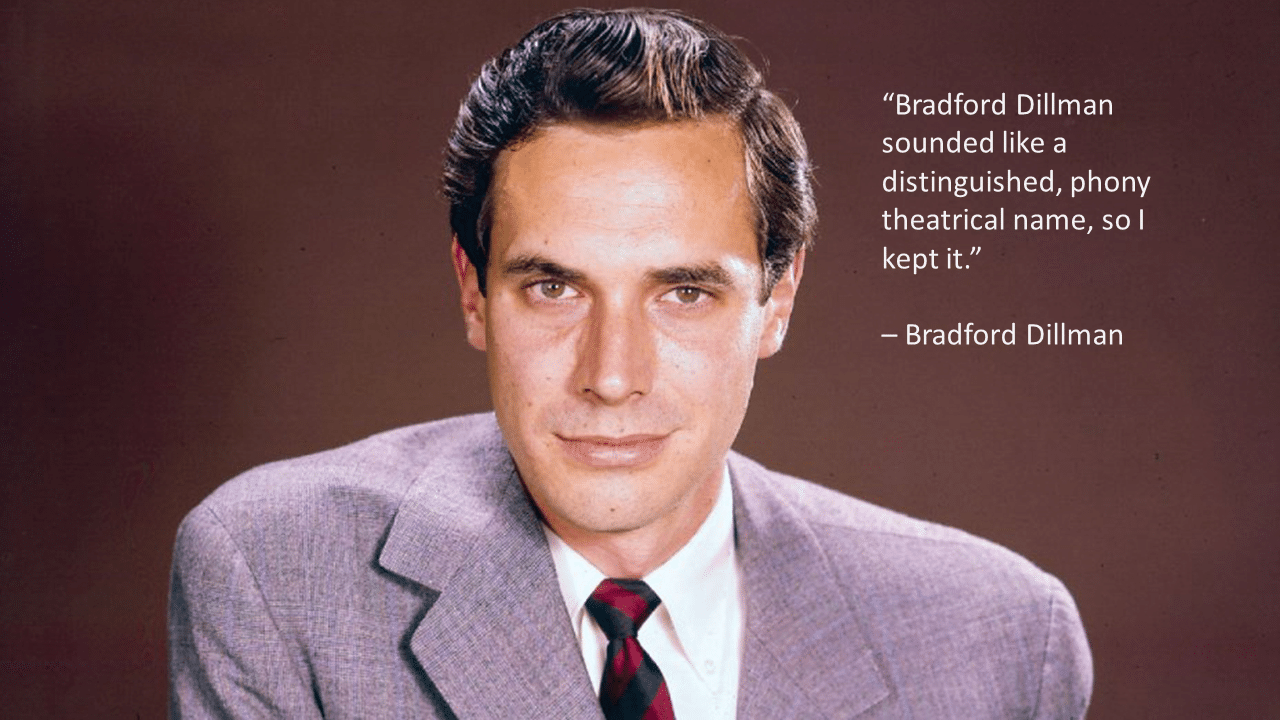
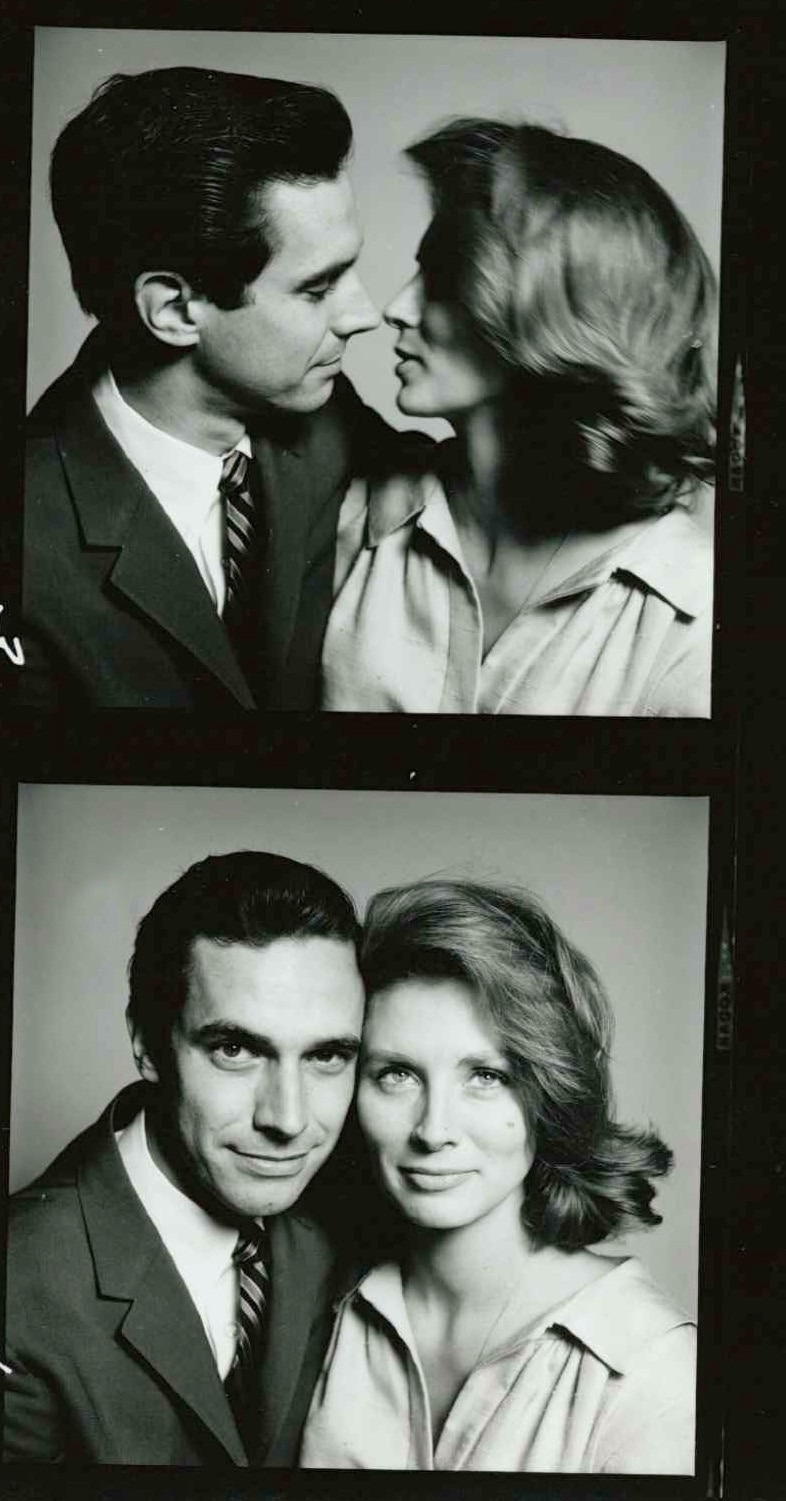
Bradford and his second wife, Suzy Parker Dillman
Bradford was most known for his roles in the original Broadway production of Long Day’s Journey Into Night and the movie Compulsion. He was on television and in more than 40 films including Francis of Assisi, Escape from the Planet of the Apes, Sudden Impact and Lords of the Deep. One of his favorite roles was as J.J. in The Way We Were and it was the theme song from this film that Pamela heard her father singing.
Mem’ries light the corners of my mind
Misty water-colored mem’ries of the way we were
Scattered pictures of the smiles we left behind
Smiles we gave to one another for the way we were
As Bradford continued to hum, Pamela could hear the joy in his voice, remembering the good life he had lived and the memories that would forever live on.
She imagined that he was thinking, “Oh here I am at the end of my life and I’m already missing you all.”
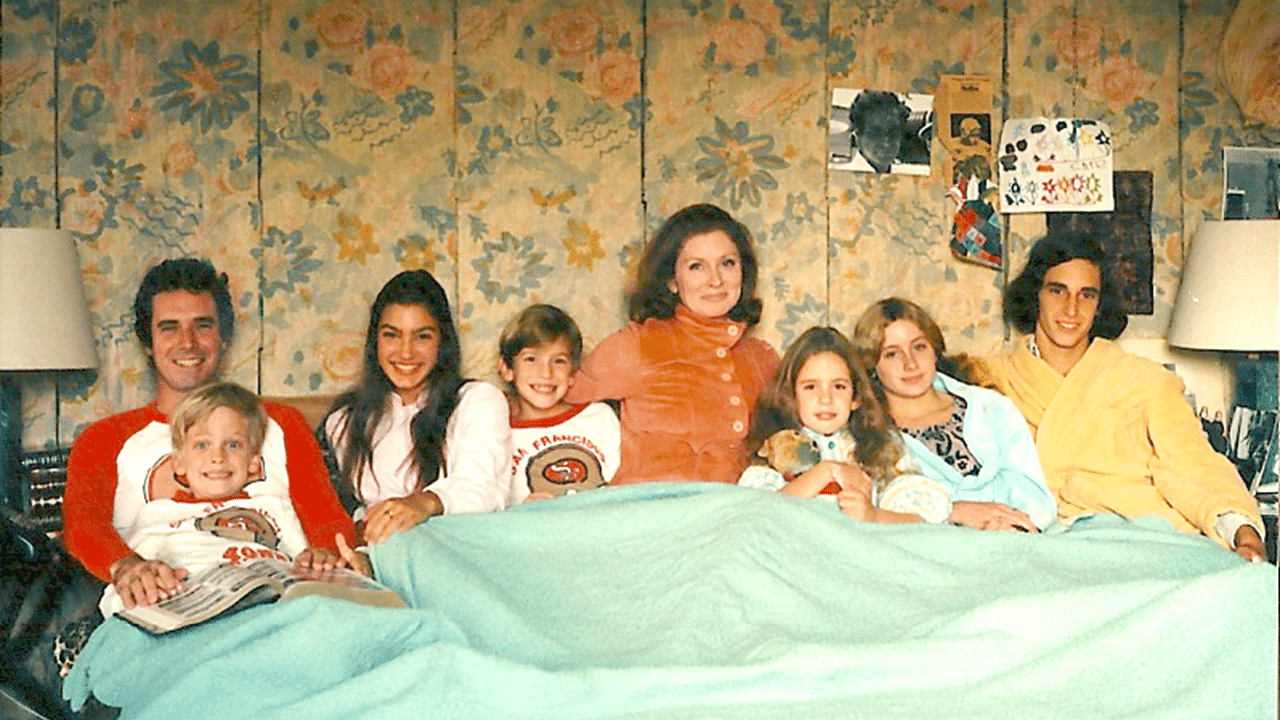
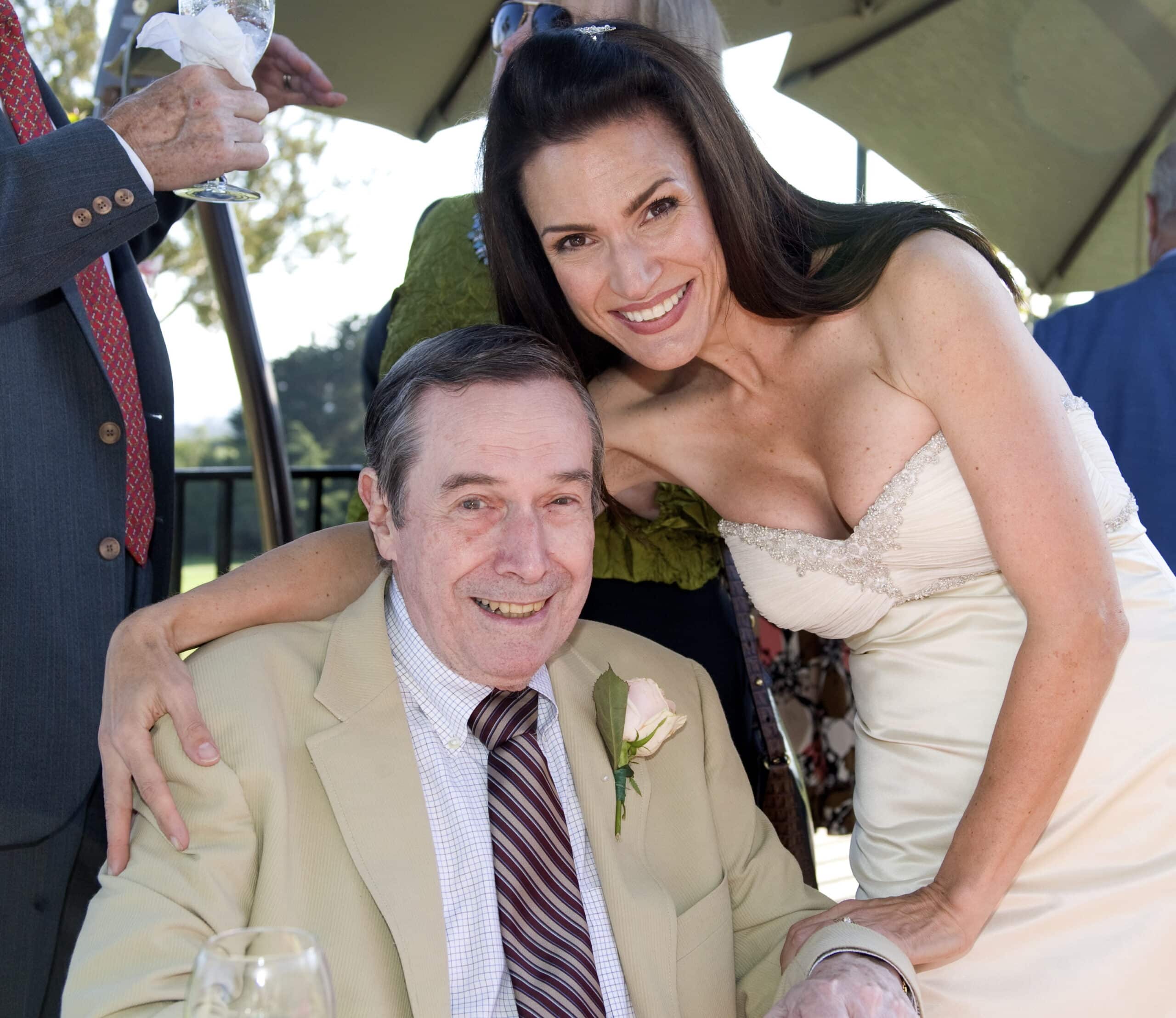
Bradford Dillman and his daughter Pamela Dillman Haskell
At this time, the discussion of hospice became more imminent. Pamela knew returning home was her father’s ultimate wish, but Bradford’s status, as well as the road conditions in Montecito, made going home impossible.
Pamela knew she could find another “home-away-from-home” at VNA Health’s Serenity House on the Mesa. When a bed became available at Serenity House, Bradford was moved, and Pamela found solace in finally being able to tell her family where Dad would live out the rest of his days.
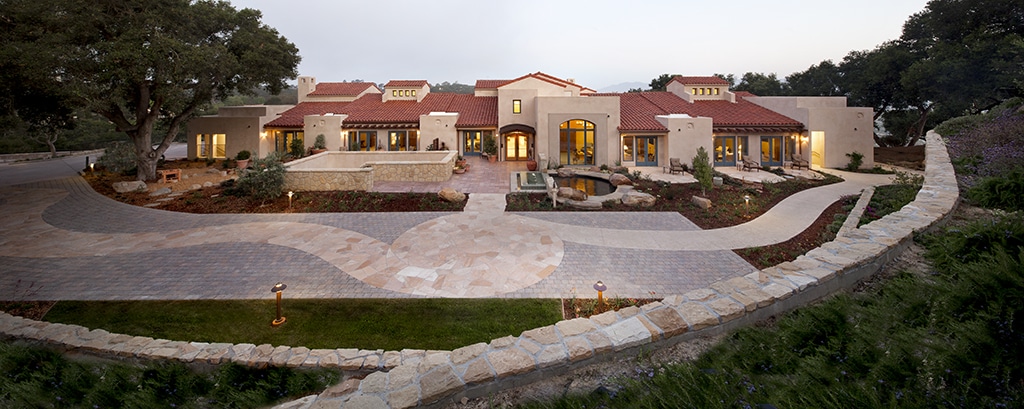
Located on the Mesa in Santa Barbara, Serenity House is owned and operated by VNA Health, and is the largest nonprofit inpatient hospice facility of its kind.
Knowing that there was finally one place they could all gather to be near Bradford, the family came from all over the country to Santa Barbara by planes, trains, and cars. When they arrived at Serenity House, the peacefulness of the place affected them immediately. The neutrality of Serenity House, being simply a home of tranquility, transported the family from any emotional distress to peacefulness.
At Serenity House, each family member could be with Bradford on their own time. They would take turns visiting one on one with their father, while the others gathered in the large family room to share stories and memories.
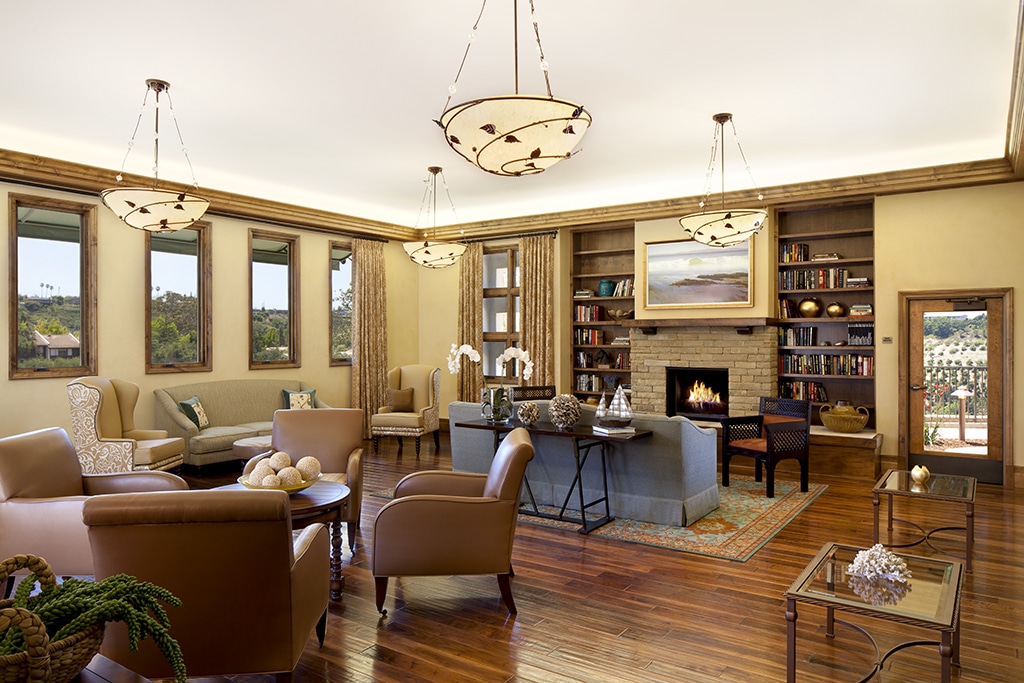
The Lillian and Jon Lovelace Family Room where Bradford’s family found a neutral space to gather “at home” and share memories.
“For my siblings it was extraordinary to see, even the ones who were very resistant to the idea [of inpatient hospice care], how the peacefulness of the environment was such a blessing to them,” commented Pamela.
Although her father was comfortable, yet really not responsive in terms of his ability to communicate, everyone knew that he could hear them based on his energy. Bradford received integrative therapy and music therapy, both of which warmed Bradford and his loved ones, especially when the music therapist played show tunes. “I couldn’t believe the fact that when I just casually mentioned, almost humorously, to the music therapists that my dad liked show tunes, that they could accommodate that,” Pamela said joyfully.
After 24 hours at Serenity House, Bradford Dillman took his last breath as his dignified self, handsome as ever, and surrounded by family. Although bringing Bradford home for his last moments was unattainable, Serenity House was exactly what he and his family needed, before they even knew it.
Pamela shared, “[Serenity House] gave the gift to the family of a beautiful end that was unencumbered by the weight of both good and bad memories that the [family] house would hold.”
Even while facing end of life, Serenity House is a neutral space that allows family and friends to gather “at home” and share memories of the way they were.
Patients and families don’t need to walk the end-of-life path alone.
Hospice care is a benefit under Medicare, Medi-Cal, the U.S. Department of Veteran Affairs, and most private insurance. All VNHC hospice patients are eligible to request free music therapy.
To learn more about how hospice care at home or inpatient hospice care at Serenity House can help your loved one and family, call VNA Health at 805.965.5555 or take the virtual online tour at vna.health/serenityhousetour.







